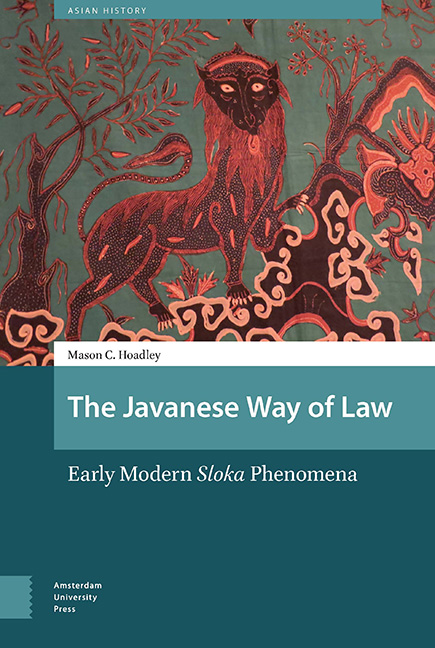Appendix III - Titles ‘Left Out’
Published online by Cambridge University Press: 20 November 2020
Summary
The point of departure in discussing the sources used for this study is the fact that legal titles, even those bearing the same name, vary markedly in content. This contrasts with the consistency of their component parts – the sloka phenomena – regardless of title or provenance. Recognition of the basic inconsistency comes from study of the era's earlier manuscripts, namely those containing the titles cited by the Pepakem Tjerbon as their source attested to by the Introduction. They thus provide a benchmark for identifying the era's most significant titles. Because the Dutch publication has a known provenance and date lacking for most Javanese legal titles, ‘Pepakem Era titles’ seems an appropriate notation. Without such a cannon it becomes difficult to defend choice of the sources used to study various facets of Javanese law. In that case one is confronted with many untapped, but relevant, manuscripts whose date and provenance can only be established imprecisely. Uncertainty can arise as to whether a title has been chosen to fit pre-formed assumptions or are the result of judgments based on study of titles relevant in time and space.
Because the issue only indirectly concerns the subject at hand, discussion has been relegated to this appendix. A start to bringing some order to the daunting number of unpublished sources can be made through distinguishing layers of textual traditions. It provides a way of breaking down the total number of texts into smaller groups in order to make analysis more manageable. In this context it can be observed that sources for the inquiry fall somewhere in the middle between precursors and successors. These are examined within the heterogeneous nature of the textual material at our disposal.
Precursors
A rule-of-thumb criterion for identifying precursors to Pepakem Era titles comes from the juxtaposition of titles’ contents and the respective manuscripts’ probable date of origins. Fortunately, the special relation existing between sloka phenomena and text provides a means of eliminating from further consideration titles included in the manuscripts cited in this study. Close reading of these titles reveals that their contents, that is, those discussed in this appendix, do not fit within the matrix of title, paragraphs, contents, and terms characteristic of mainstream texts. Significantly, these were likewise omitted from the Pepakem Tjerbon's Introduction.
- Type
- Chapter
- Information
- Javanese Way of LawEarly Modern Sloka Phenomena, pp. 237 - 250Publisher: Amsterdam University PressPrint publication year: 2019

